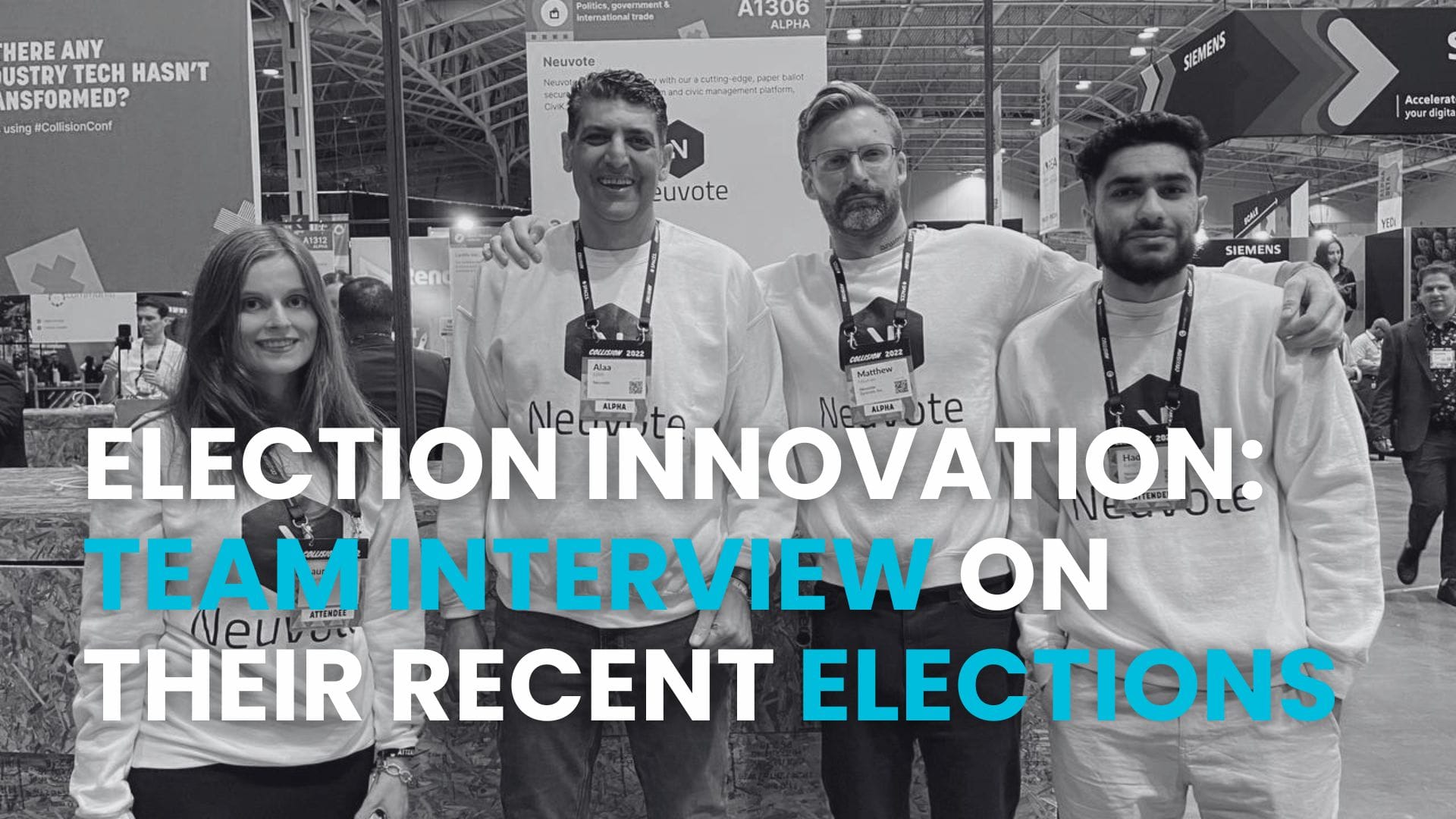Neuvote's Online Hybrid Voting System Sets New Standards in Northwest Territories

Neuvote, the pioneer of hybrid online voting systems, recently accomplished its third successful online election - in Canada’s Northwest Territories (NWT). This achievement builds on similar triumphs in Brazil and a small town in Northern Ontario. Viktoriia, Neuvote’s Communication Manager, engaged with key team members—Matthew Heuman, CEO, Laura Garrett, CTO, Hadi Aamir, Software Developer, Alaa Elalfi, Lead Product Designer — to uncover the intricacies of this unique election. Through this interview, they shed light on the challenges and opportunities encountered, shaping the future of online voting. Neuvote is the sole provider of a hybrid system combining digital and paper ballots, forging a path for revolutionary advancements in election management.
VIKTORIIA: From your perspective, what was unique about the Northwest Territories election?
MATTHEW: NWT was very different for several reasons. First, it was a territorial election with massive logistical challenges. The population level was low. It was around 40,000 residents in total. But it's a territory that is spread out in very remote areas. We were dealing with communities that didn't have road access, and ballot boxes routinely had to be helicoptered or snowmobiled back from the communities for counting. Massive wildfires this summer that displaced many of its citizens from their homes exacerbated the lack of access over great distances.
Secondly, for NWT, we had to set up a rigorous security apparatus because the requirements for this territorial election were significant.
Lastly, NWT has had recounts because the margins are so slim for voting down to a certain percentage. If it hits that threshold, it automatically goes to a recount. In 2019, they had a situation where they used online voting before, but it just needed a more sophisticated system. When the recount occurred, and the chief electoral officer handed in the results from the online voting system, the judge dismissed it. He said, these aren't votes, it's just a report. I want to see where the votes are.
Because we've developed this hybrid system with paper, we could provide both the cryptographically secure online voting system, which met the technical requirements, and paper ballots. We have essentially created a ballot box of an online voting system. I think, the first time worldwide that this actually occurred.
It was definitely a historic moment for us. But it was a moment for the industry because this system is now here, where you have both an online and paper ballot-based system, where voters can access anywhere remotely.
And I think that was the most significant technological shift; we've been able to implement all these different things we've been working on. And it's just been more sophisticated. Now, there are more features and technical appreciation for what we've done.
VIKTORIIA: How did Neuvote's online voting system enhance voter participation or accessibility in this election?
ALAA: Our online voting system contributed significantly to greater voter turnout and accessibility in five ways:
We are particularly proud that our online voting system allowed people affected by the wildfires to cast their votes remotely, especially for those displaced and/or unable to reach the main city or certain places within the province. Our online voting system has proven to be highly beneficial, especially during emergencies like natural disasters, and it significantly increased participation in elections, particularly for individuals who face accessibility challenges.
VIKTORIIA: In what ways did this election set a precedent for future electoral processes, both within the Northwest Territories and potentially on a broader scale?
LAURA: I think this election showed it is possible to have a hybrid system of online voting and printed ballot since we had a 95% turnout for those who registered to vote online. It shows that people are willing to use the system if offered. The system is secure, as we've seen. It's been used in Estonia for years. So, there's security and accessibility in the unique circumstances of Northwest Territories, where they had the wildfire issues and uncertainty about where people would be when they voted.
We've shown that this system can be a welcome use to substitute in-person or this system can be used to add to in-person voting as a welcome compliment, and we'll incorporate the user feedback we received to continue to make the system even more user-friendly and accessible for future elections.
MATTHEW: Different jurisdictions have different requirements. This is typical in the election industry; different countries will have their version or flavor of how to run an election. You have systems like Brazil, where it's very particular to the Brazilian industry for various reasons. You have systems like India, which is again very particular to their specific country's election needs.
What is unique about the NWT election vs. other jurisdictions is that this was the first hybrid model ever used where we had a proper one-to-one paper ballot and online voting decryption. I hope that other election bodies understand the significance of providing that audibility with the paper and the convenience and accessibility of online voting. This is the first of many elections where we're deploying this technology.
VIKTORIIA: Can you discuss the security measures or protocols implemented to ensure the integrity and safety of the voting process, especially with the introduction of the new hybrid voting model?
LAURA: All of our data is encrypted at rest and in transit. All our servers and databases run in virtual private clouds that the public cannot access directly. It adds an extra layer of security. Our databases and servers are separate. They are separated into voter data, authentication data, and actual election system and data.
Each section is completely isolated from the other, adding an extra layer of security. If the voter database were accessed in an improbable event, it would have no information about the actual votes. It means all of the votes are protected.
All the votes are stored cryptographically and cannot be decrypted without a unique key saved on a physical device. Even when the votes are decrypted to count numbers and then tally the number of ballots to be printed, they are dissociated from the voter data when it comes to printing. You only print a ballot with a marking; it has nothing to do with a voter who marked a ballot.
HADI: We also have the user register and login and two-factor authentication. We ask them to verify the number and code whenever they register. We also ask them to scan the QR code for two-factor authentication every time we log in.
MATTHEW: We use very sophisticated security mechanisms for our system, as Laura and Hadi discussed.
As for security mechanisms for the paper, everything is secured. The procedures that our partner Xerox has put together for actually going through the printing are very formal and very standardized. They obviously provide services for governments at all levels, including the most sophisticated Military Intelligence communities, and so they can implement the printing protocols we used for this election. won't go into too many specifics here, but it is probably the highest level of security I've ever had the privilege of using.
VIKTORIIA: How many voters were eligible to vote in the NWT sub-election, and what was the turnout? How does that compare with other provincial elections in Canada?
MATTHEW: The unique thing about Northwest Territories was that we expected a very small election. When the wildfires happened, though, that's when everything changed. Suddenly, there was a displaced population due to a major evacuation of cities. We faced uncertainty regarding the duration of this situation, especially considering the necessity for everyone to vote online. The logistical challenge of dealing with such uncertainty arose – how to manage online voting effectively in these circumstances. Fortunately, scaling up to accommodate everyone voting online was relatively easy. This scalability is one of the significant advantages of online voting systems.
Voting online is much easier than printing, distributing, and setting up polling locations everywhere.
Any jurisdiction, whether it's a small municipality, province, or country, is essential at all levels, and that's why our system is designed to treat every election as if it were the most crucial election possible. That's the way we view it.
There's no difference between a small vote in a small area or a vote in a federal. It's all the same thing, and they should all be considered.
VIKTORIIA: But you also had a printed paper ballot. In fact, Neuvote is the only online voting company that combines online and paper balloting. How does the paper ballot part of the process in the NWT work, and why is it important?
MATTHEW: We got into the industry with the assumption that paper should always stay part of the system because if you get down to the fundamental aspects of an election, there needs to be absolute assurance that the vote took place, properly. While we are perfectly confident in the secure cryptography of our online voting system, having a parallel paper ballot allows a recount to occur where you're just counting paper like every other channel. And that is typically described as the most secure and well-understood voting method.
That's why we've been focusing on building out a system that combines those two aspects and produces the cryptographic report of every vote that occurred in this secure fashion to allow the vote to occur online but also create that paper record so that they can be counted in unison and actually improves the system.
Because you're producing a one-to-one match of every cryptographic or digital vote and every paper vote, you can go back and count and ensure that both channels recorded the entire election accurately.
VIKTORIIA: This election included independent, non-contractual Observers. Who are they? And why included in this election? How did the inclusion of these observers impact the dynamics of the election in the Northwest Territories compared to previous elections?
MATTHEW: I think Northwest Territories has done some unique things. They've led the way in understanding the technical requirements for secure online voting. They have also done fantastic work understanding their First Nation and Indigenous communities. Part of the work that they've done is to have multiple languages supported for some of their marketing materials to encourage people to vote because a lot of their communities are First Nations. Perhaps they've been there for thousands of years, and those native languages are essential for those particular communities. Having electoral support in those languages was very important.
As a result of this approach, one of the Observers from Elections Canada came out specifically to better understand how to serve the First Nations and Indigenous communities across Canada. Other observers were from other election bodies. But also invited was a third-party critical observer, one of the leading experts in online voting technology in Canada, if not the world, Dr. Alexander Essex.
For the Observers to come out, it was to understand what NWT had done, and this speaks to how we view the industry, too, which is the more transparency, the better.
During the election decryption ceremony, I had everyone watching every move I made, sitting beside me, recording me, and reading my screen sometimes. It was a very harrowing experience. Imagine working in a high-stress environment and doing complicated work in a terminal window. It's interesting. Imagine doing it with the guy, Alexander, who will criticize you more heavily than anyone else, looking over your shoulder the entire time.
That was the experience that we had to endure. It was stressful, I'm not going to lie, but it went successfully, and we got everything done. Open up and have that level of transparency and still confidence in what we're doing and the technology that we're using.
CEO of Neuvote, Matthew Heuman, during NWT election
VIKTORIIA: How do you anticipate the success and innovations from this election will influence or shape the future landscape of elections, particularly regarding technology integration and transparency?
LAURA: I hope the election's success will make people more interested and trust online elections. Maybe one day, we could vote online in Toronto, and you could vote from your house or phone. You don't have to take any time off work. If you have accessibility issues, you don't have to worry about transportation. And once you vote, we have end-to-end verifiability. You'll be able to verify that your vote was cast as intended, adding an extra layer of transparency to the election.
I think it's incredible that just over a year ago, our system was just in the early stages where we were emailing out secure credentials. Now we have an entire voter portal where people can log in with their two-factor authentication and view all the information about the upcoming elections, their candidates, change their password and everything and log in anytime and then actually vote in their election all in one seamless experience.
HADI: I agree with Laura. The ease of voting from home is definitely a big one, especially for young people. I noticed they were usually too lazy to vote sometimes, even myself, in the past years. So, changing that and making it more remote encourages the young generation to participate in voting.
We've come a long way. All the improvements and investment advancements we've made are amazing. It's exciting to see that we're onboarding quickly.
ALAA: 100%. Successful online voting stories, like NWT's, serve as valuable learning experiences, inspiring future improvements. These successes have prompted technology companies to enhance systems using face detection, digital IDs, and AI innovations. As trust in online voting grows, transparency becomes more evident. These advancements promise more secure and accurate elections, drawing on improved insights into voter data. Examples like NWT set international benchmarks, showcasing the potential for successful, transparent, and secure online voting systems.
Developing this technology from brainstorming to practical application is rewarding, especially with user feedback that helps refine the system. These insights are vital for continual enhancement, ultimately aiming to impact voter turnout positively.
MATTHEW: As I said, the most straightforward answer for me is this will set a precedent for how we believe online voting should be, and I hope other election management bodies pick up on this. We're very excited about it to be done. It's been a long time coming. The teams have been working on this for a few years now, but this has been a theory I've had that has finally come to fruition.
I launched Neuvote in 2015, so I couldn't be prouder to see the power of online voting and our hybrid paper ballot system in action. I am hopeful we have done something meaningful and impactful for the election industry.

